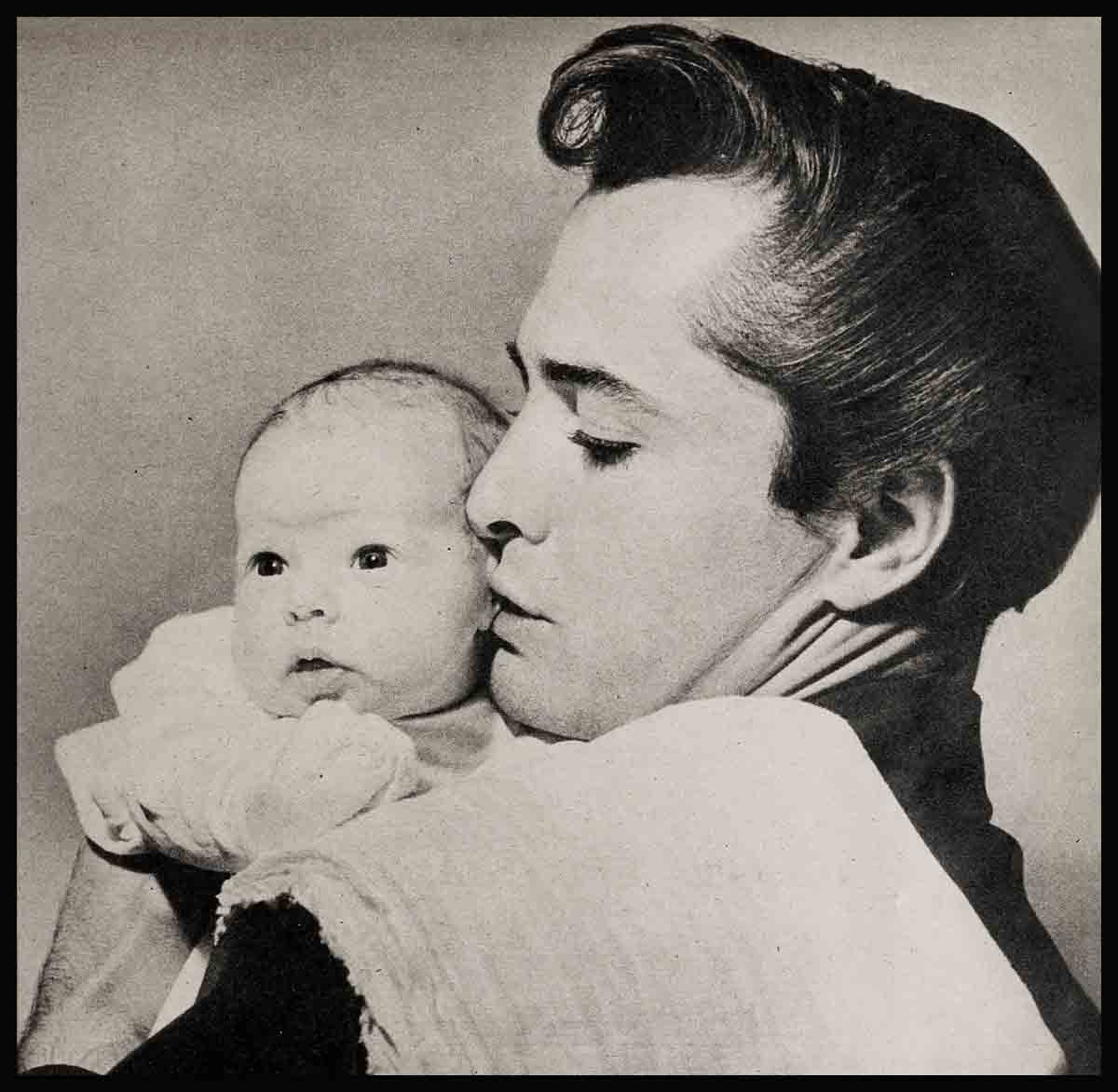
New Baby-New Happiness—John Derek
One of the advantages of having a child by Caesarean section is that the mother-to-be can call her own shots. She can make an appointment for the birth of her baby. This method of delivery is also extremely convenient for such nervous husbands as John Derek. His wife doesn’t wake him at three or four in the morning. There is no sudden panic, no mad race to the hospital trying to beat the stork. Everything is placid, measured and arranged before time.
John Derek’s wife, a beautiful, pixie European named Pati, took care of all the details. Last October she called on Dr. Benbow Thompson, an obstetrician who has delivered the babies of more screen stars than any other Hollywood physician.
“I wonder, Dr. Thompson,” Pati said, “if I could have my baby at eight or nine in the morning. Then John and I could have a good night’s sleep.”
Born in Turkey of Greek and Russian parents, Pati Derek has been in the United States less than ten years. Her English grammar is perfect but she still speaks with a soft foreign accent.
“You can have your baby any time you want,” Dr. Thompson told her. “Have John drive you in tomorrow and well do it then.”
Early the following morning—a “little after six—John loaded his wife into. their 1952 Cadillac convertible and drove the eighteen miles from their home in Encino to the Hollywood Presbyterian Hospital.
At eight a.m. on October 16, his second child, a seven-pound, three-ounce girl, later christened Sean Catherine Derek, came bawling into the world.
A few minutes later the twenty-seven-year-old actor, one of Hollywood’s most handsome men, was called to the delivery room. His daughter was held up for his inspection. He was permitted to count her does and fingers, to see that she was born a perfect shape. As John Derek looked at his red-faced, black-haired infant, he smiled as all fathers smile, but in his heart he prayed that this tiny girl would be saved the near-tragic suffering of his first-born.
You must have read or heard at some time that John Derek is immature, moody, difficult and humorless; that he is as tense and high-strung as an overtrained colt; that he is quick to anger and easy to annoy.
For the most part these stories are true, but John is not like that naturally. There was a substantial reason behind his displays of nervousness and irritability.
Four years ago his son Russell, a good-looking child, was born with a split esophagus.
The esophagus or gullet is the food tube in the body which delivers the chewed-up food, after swallowing, from the throat to the stomach, About one-half an inch in diameter, it extends from the pharynx to the opening of the stomach and is located behind the windpipe.
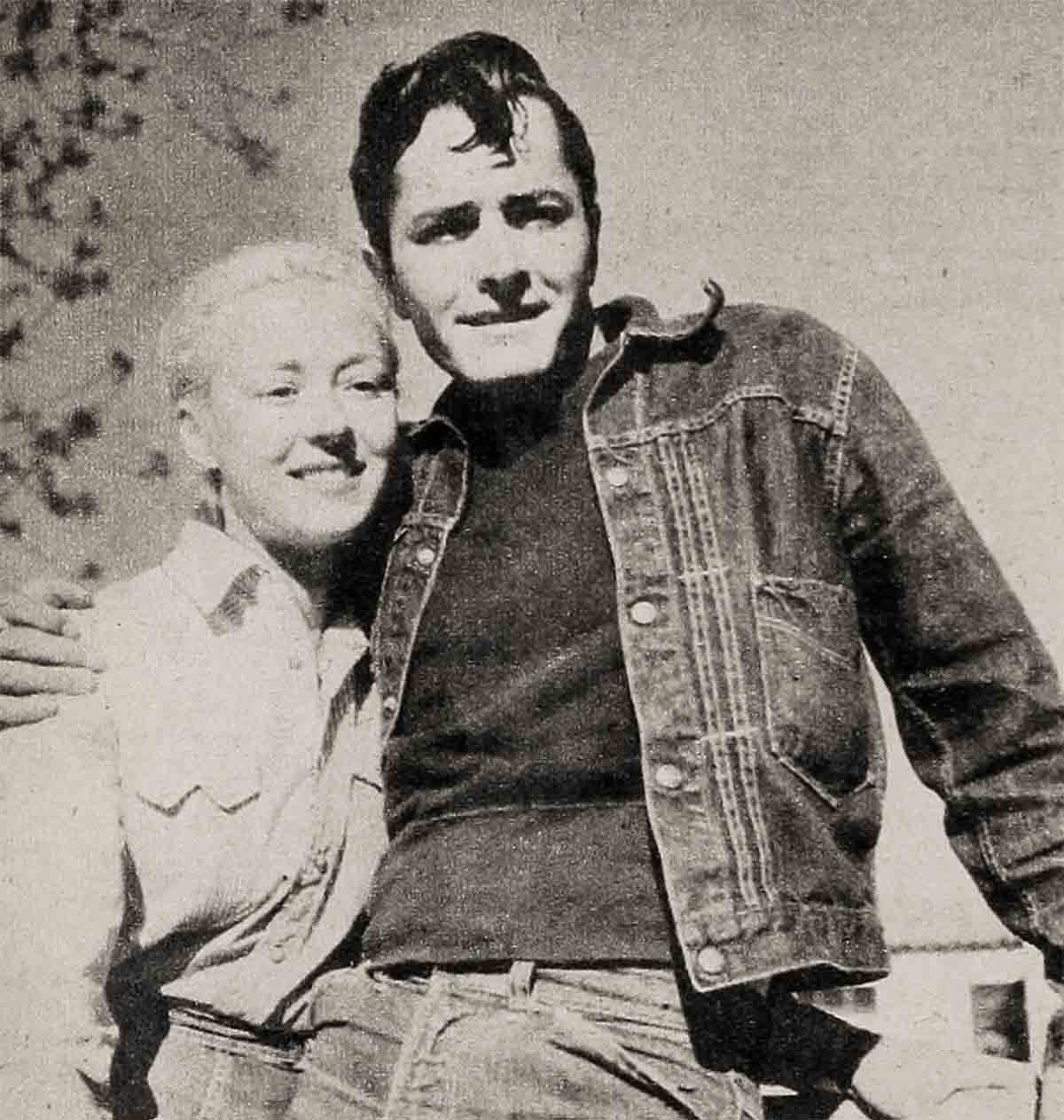
A few days before Russ was born the nurses at the hospital were given a lecture which included the symptoms of a faulty esophagus. In a new-born child the tip-off is the inability of the infant to swallow anything.
On the day Russell Derek was born, the nurse noticed that he couldn’t swallow his sugar water. She reported her suspicion to Dr. Louis Earle, the pediatrician, who promptly examined the infant. He confirmed her suspicion. Russ had been born with a damaged esophagus.
Unless major surgery could be performed at once, John and Pati Derek would have no son to take home from the hospital. And even if surgery were performed, the chances were only fifty-fifty that the child would survive.
Pati Derek lay on her hospital bed, chatting happily with her husband. John sat beside her, holding her hand and telling her what a great horseman he would make of their son. He was proud of his son. Both he and Pati had wanted a boy. Then the doctor walked in to speak to the unsuspecting couple. “I sensed something was wrong,” John now recalls, “but I didn’t know what it could be.”
“I want you to brace yourself for a shock,” the doctor warned Pati. Then he told them. Their little son was dying. No food of any sort could pass down the baby’s gullet. Intravenous feeding might keep him alive for a little while, but not for long. There was only one thing to be done. The infant would need an operation immediately. He recommended that Dr. J. Norton Nichols, who had specialized in that particular technique, be called in to perform the operation.
Pati looked at John. She could not speak of the anguish in her heart and the fear in her mind. John was immediately decisive.
“Let’s get him,” he urged. “For God’s sake, let’s get Dr. Nichols here at once.”
They called the surgeon and he came. Fourteen hours after he was born, little Russell Derek was wheeled into the operating room. He was anesthetized, and then the nimble fingers of Dr. Nichols went to work. The scalpel cut through the baby’s chest, laying bare the trachea and the gullet. Dr. Nichols found the break in the esophagus and repaired it. The chest incision was sutured. The surgery took hours. Pati and John waited in Pati’s room. They hardly spoke. They sat looking at each other, silently praying. Waiting was eternity, a seemingly endless torture.
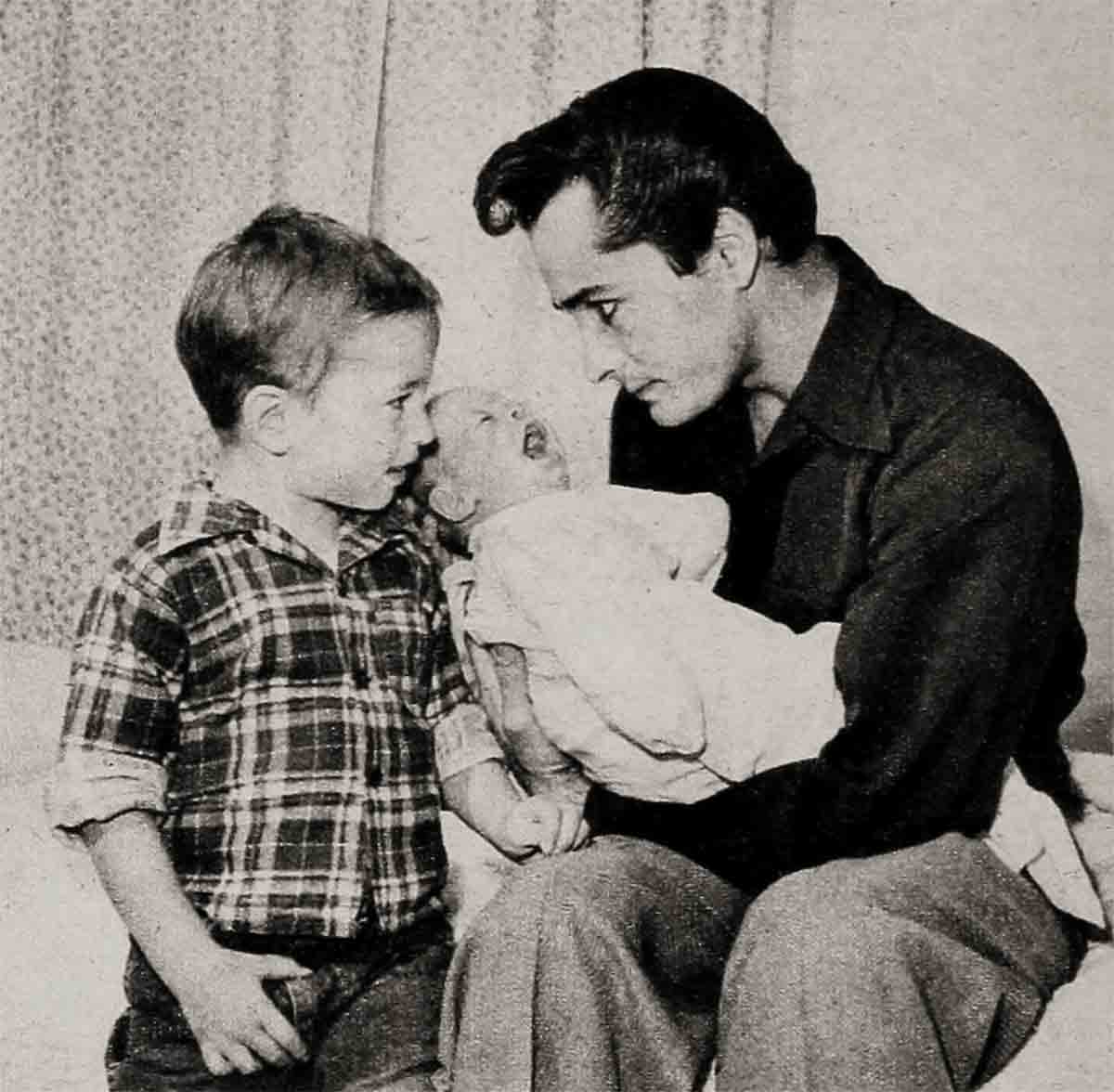
Finally, the doctor came in. “I think he’s going to be all right. But he’ll need a lot of eare for a long time.”
They kept Russell in the hospital for weeks. And even how that he’s four, Pati and John have to be careful that nothing gets stuck in his throat and that he doesn’t gag on food.
This vigilance is part of the reason John Derek has been so edgy and nervous. In the last four years he has made many a wild dash to the doctor’s office’ with Pati clutching her son, seeing the boy’s face turn blue, afraid that he would strangle on a piece of bread before they could get relief for him.
With this kind of trouble you can understand John Derek’s worries when he was about to see his baby daughter for the first time.
“Was she really perfect?” he asked himself. Maybe she just looked fine and then when the pediatrician came, he’d find something wrong. Maybe it would be Russ all over again; the near-tragedy, the surgery, the countless hours and weeks of strain and worry:
There’s nothing like that. Sean is a healthy, happy baby. Her big brother is coming along fine, and now that they’ve weathered their first big crisis together, John and Pati Derek seem to be more in love than ever.
“Quarrels and differences that we had in the past,” Pati says, “now seem so small, so insignificant, just part of our adjustment.”
People used to say that John and Pati quarreled incessantly. They predicted the marriage would never last. Too many differences in background, taste and outlook. For instance, John likes meat and potatoes. Pati, born in the Near East and brought up in Paris, was a gourmet. She loved to prepare elaborate dishes, garnish them with rich sauces.
A few months after they were married, John came home from the studio to find that Pati had worked all day preparing a gastronomic delight—crépes suzette, chicken cooked in wine, some other tasty delicacies.
Her husband took one look at the lovingly prepared ‘food. “Looks great, honey,” he said. “But this sort of stuff isn’t for me. Throw on a steak. I’m all in.”
Pati, discovered by Darryl Zanuck after World War II when she was dancing in a Paris nightclub, had given up her career at 20th Century to marry John.
Now she wondered why. In no uncertain terms she voiced her doubts. John said he couldn’t help it if he happened to like steaks. This gooey French stuff just didn’t settle well in his stomach. Tears, temperament, recrimination.
Pati finally accepted the fact that her husband is strictly a meat and potatoes man. Nowadays that’s what the Dereks eat.
“Actually,” she says, “it took me about two years to get adjusted to John, to understand his ways. He has an enthusiastic nature. If he likes sailing, then he will buy a sailboat. Maybe he doesn’t know how to sail and will wreck the boat the next day, but it’s best to let him have his own way. I’ve been told that I spoil John, that I have the European woman’s attitude toward marriage. You know, that the man of the house does hot belong in the kitchen, that he shouldn’t wash dishes and make beds.
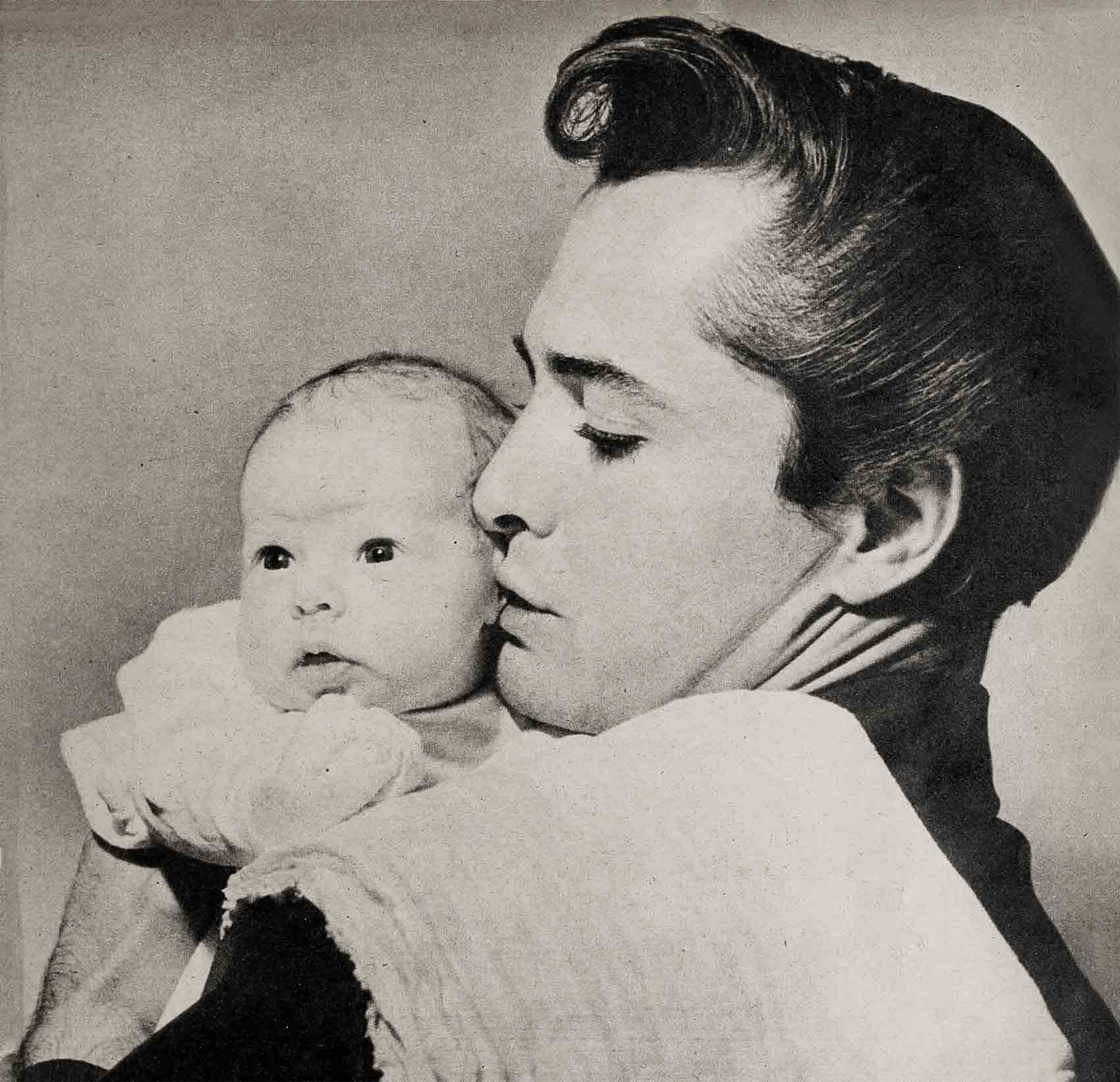
“Well, I believe that. Certain things in the house are women’s work, and do not fit a husband’s dignity. In an-emergency if a husband loves you he will do everything, but it is not fair to make him share the housekeeping chores after a days’ work.
“Not that John hasn’t done fl When I was pregnant with Russell, I had to stay in bed for many weeks. John would get up at six in the morning to take care of my dog and make breakfast for me. He would serve it to me in bed. At night he would carry me a dinner tray and he would clean all the dishes and straighten the house. That’s when I learned that what counts most in a husband, what counts most in any man, is the way he acts in an emergency when his family really needs him.
“Like the trouble with Russell. I don’t know what I would have done had John turned out to be a weak man. It was his strength, his how do you call it?—his drive, his will power—that has made things turn out well. It is very difficult for an actor to work and concentrate and at the same time to realize that he has a baby son at home and that maybe the son can die any minute.
“It has not been easy but I think we are now out of the woods.”
In contrast to Pati whe is quick to express her feelings about anything, John Derek has lived within himself for so many years that he finds it extremely difficult to talk about the crises in his life.
When you ask him to tell you about the solidifying effect of Russell’s illness on his marriage, he comes up with, “Well, it was a little rough with Russ. Had some trouble with his esophagus, but he’s okay now.”
He cannot bring himself to talk about the terror he experienced in the hospital as he waited for the doctor to bring some news about the success or failure of the operation on his son. He cannot talk about’ his suffering, physical or mental.
Instead, you hear that John was worried sick about the big mortgage on his home, that he sat up nights wondering if he could pay his bills. Derek could talk freely about financial matters, but such discussions were substitutes for the major worry in his life, the health of his son.
Nor did he ever talk about the monthly trips with Russ to the hospital. He never described how the little boy’s esophagus was stretched with a glass tube. He never told about how long it took to feed the child or what nerve-racking meticulous care was necessary. He never told how, despite this precise care, the baby would sometimes choke. Pati would scream, clutch the infant to her breast, and they would race to the car. Then the life-saving dash to the doctor’s office.
John Derek is an only child and the child of divorced parents. He was born into the motion picture business. His mother was an actress and his father a rector. They separated when John was five.
The boy was passed from parent to parent. He was insecure because he didn’t have the kind of home other children had. Children need to conform. When circumstances make this impossible, they develop defenses or compensatory reactions. John became withdrawn.
Later, he tried to kid people into believing that he was the happy-go-lucky type, but he never succeeded. In his youth he never got the love and discipline he needed. He went from one school to another in Los Angeles and Santa Monica but didn’t graduate from high school.
Fortunately, he was handsome. He had the friendship of Russ Harlan, a photographer at the studio where his mother worked. Harlan was a kind of father to John. He taught me how to ride, how to box, how to hunt, how to do all the things every kid wants to learn. My son is named for him.”
One night when he was bowling at an alley in Westwood, John was spotted by Henry Willson, a talent scout who has discovered more than one handsome young man. Willson was working for Selznick then and he signed Derek at $150 a week.
John attended drama classes and was given a bit in I’ll Be Seeing You. “He loused it up real good,” a director recalls, “but he was only a kid then.”
After serving with the Paratroops in the Pacific, after eleven and a half months in the Philippines, the kid returned to Hollywood a man. Again his face, not his acting ability, got him a contract—this time at 20th Century.
It was here that he fell in love for the first time in his young life. He fell in love with Pati Behrs, a young dancer Darryl Zanuck had discovered in Paris.
“Pati was making a good salary,” John says. “She was living it up in the Bel Air Hotel while I had a crummy little apartment, and it looked as though the studio meant to make her a big star. They kept her around for three years, gave her a few bits, and then out.
“We took a liking to each other while we were in dramatics class, and then we began going around. Down to the beach, rides around town, a few shows. No night clubs. I hate night clubs. And then one night in 1949 we decided to drive over to Las Vegas and get married.”
With his marriage, John at twenty-three found screen success. He had read a novel, Knock On Any Door, and was convinced that he was born to play the role of the juvenile delinquent. He begged his agent to get him in to see Humphrey Bogart who was producing the picture independently.
The agent tried to high-pressure Bogart. “You’d better sign this kid right now,” he told Bogey. “He’s so hot Metro is dangling a big fat contract in front of him.”
“Nobody is dangling anything in front of me,” Derek interrupted. “I just want to play this part, Mr. Bogart. I want to play it real bad.”
Bogey took a chance on the kid, and as he says, “He was tops. Just tops. Gave the part everything he had. The kid’s okay.”
Columbia Pictures signed John to a seven-year contract (with options, of course) on the strength of his performance and then cast him in All The King’s Men which won the 1949 Academy Award.
Anxious to capitalize on his popularity with the teen-age crowd, Columbia cast Derek in a couple of Grade D pictures. He didn’t like them but he was in no position to complain.
When Alfred Hitchcock wanted to borrow him for a role in Stranger On A Train and the studio said no, John began to gripe. A few weeks later, Paramount, having been notified of Alan Ladd’s intention to leave the lot, tried to buy up Derek’s contract as a protective move. Again, Columbia said no.
This time, John gave vent to his feelings. The studio boys accused him of getting the “fat head.”
“The kid should take it easy,” one of them explained. “This high-pressure routine won’t get him anywhere. He’s doing okay.”
Only John wasn’t doing okay. Russell Andre Derek had been born. The medical expenses were astronomical. The repeated operations, the special care. This was an ordeal that was almost impossible for outsiders to fully appreciate.
Not only did Pati and John see this ordeal through together but they decided to have more children and face another kind of ordeal. John was determined to get out of his contract with Columbia.
All during Pati’s second pregnancy he clamored for his release. The studio refused. They loaned him out to Republic for Thunderbirds. Then they cast him in two adventure spectacles, Posse and Prince Of Pirates. Then they made him star in a TV film for the Ford Theatre. And only when the video picture was completed would they finally consent to give the young man his freedom.
Now that he has his occupational freedom and a healthy new daughter, John’s changed. He is again the relaxed, cheerful young man he was before he came close to losing his son. And he is again ready to devote himself unreservedly to career.
“I’ve already done one picture for Republic on my own; Fortune Hunter it’s called. I’ve got confidence in myself after working in fourteen pictures and I know I can make a go of it. I like this business and I want to work hard in it.
“In four years of marriage, Pati and I have had more than our share of worries. With Sean’s birth, I’ve got a feeling that our luck is changing. When that little girl was born she brought glad tidings with her. From here on in, the keynote around our house, as long as en have their health, is going to be happiness.”
THE END
—BY SUSAN TRENT
It is a quote. MODERN SCREEN MAGAZINE MARCH 1954


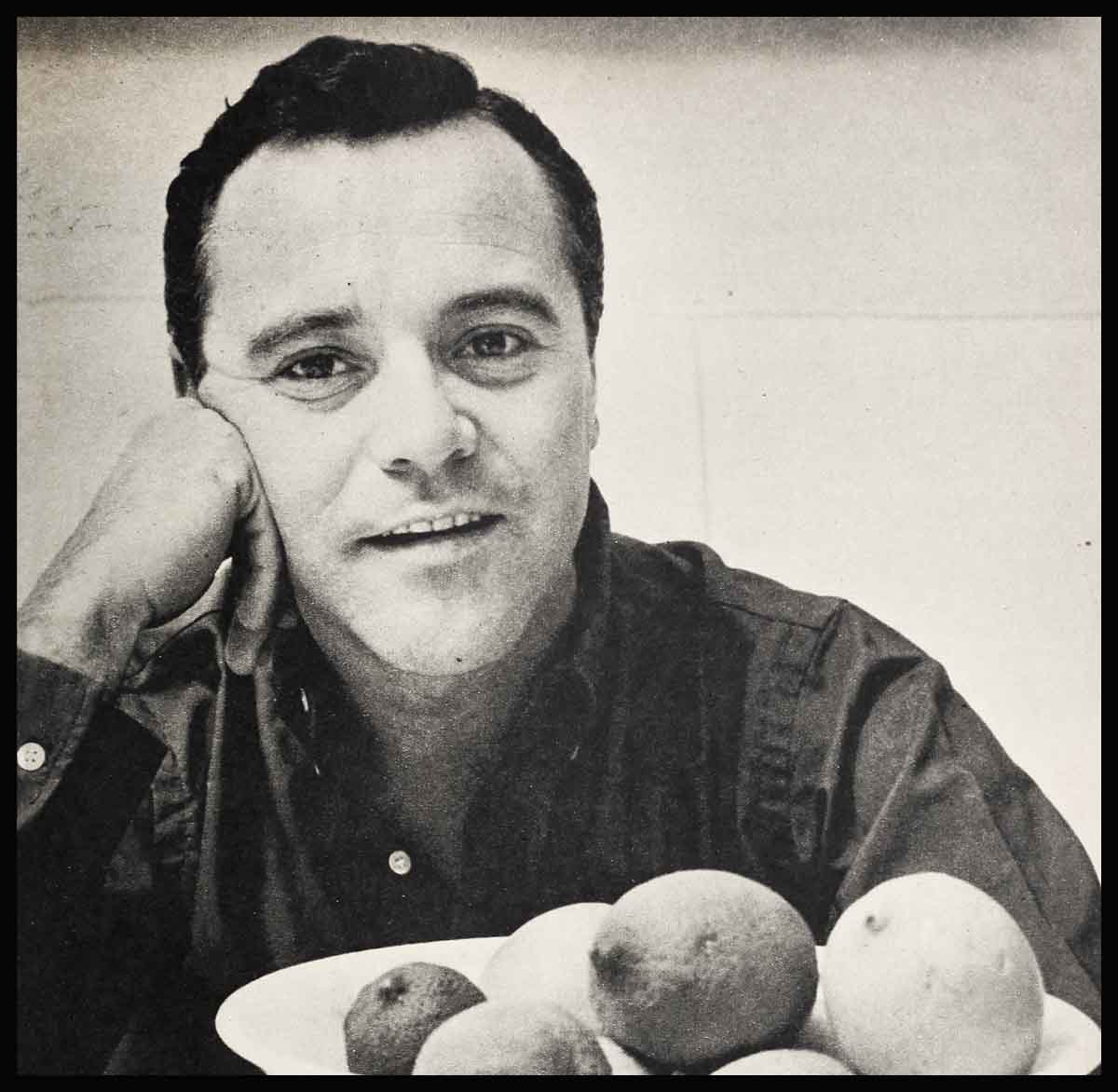


No Comments